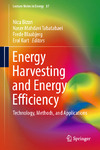Energy Harvesting and Energy Efficiency

View/
Date
2017Author
Bizon, Nicu
Tabatabaei, Naser Mahdavi
Blaabjerg, Frede
Kurt, Erol
Metadata
Show full item recordAbstract
Energy harvesting and energy efficiency are two key topics for today’s power
community. In the development of modern society, one of the key factors is to save
energy in order to become more independent of other resources. Two important
approaches can be taken—one is to change behavior and thereby save energy and
the second is to develop new technology which is able to save energy in different
applications. Chapter 1 gives an overview of challenges and possibilities in terms of
energy saving and also energy efficient use.
Initially, the first key topic—energy harvesting—becomes one of the most
motivated fields of the multidisciplinary science due to the complicated features
of the harvester materials, dependences on various mechanical, electrical, and
magnetic parameters, rich responses on different external excitation frequencies and
strength. Strictly speaking, vibrations stem from either man-made systems or natural
processes can be used as an important electric resource for
low-power-consuming electronic devices such as transducers and wireless sensors.
That can contribute at the batteryless applications for much sustainable and
renewable power generation, whereas some technical problems should be solved to
achieve the expectations of the electronics society. Although conventional harvesters
work on the basis of linear resonance, there exist certain parametrical
limitations on their power generation. Indeed, excitation frequency, electrical load,
manufacturing tolerance, and ambient temperature play important roles in order to
determine the optimized energy generation. Besides, the nonlinear nature of the
vibration phenomena contributes at the power, and these nonlinear effects cannot be
neglected for an optimized harvester system. Thus, Part I of this book initially gives
an outline to the reader on the electromagnetic and piezoelectric energy-harvesting
systems and then focuses on the theoretical and experimental techniques by
introducing different harvester systems.
